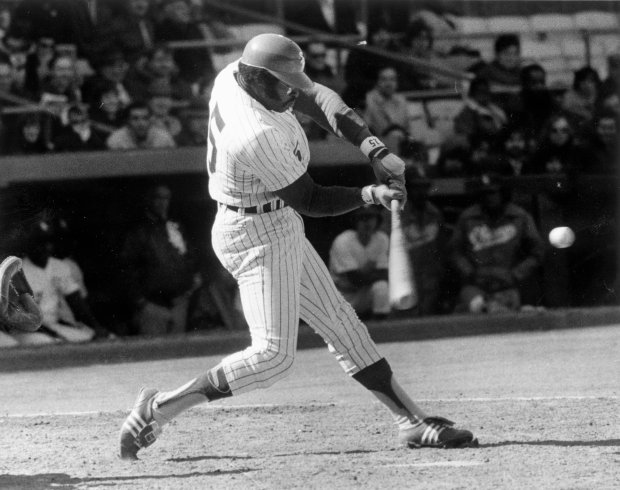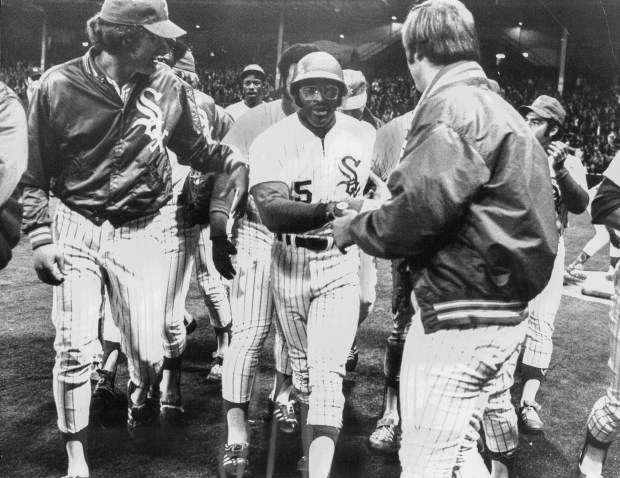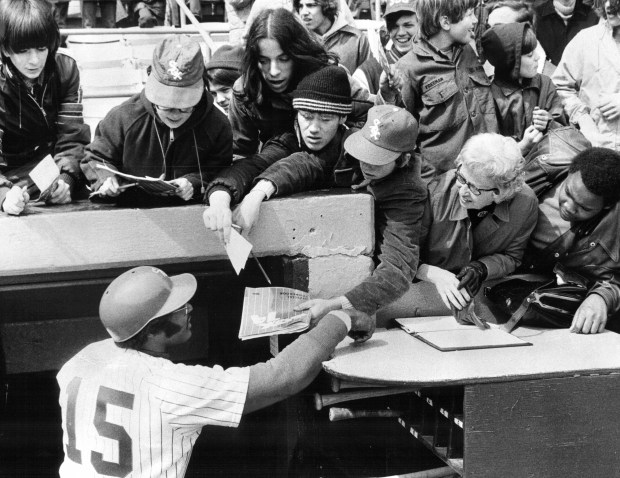Richard Allen Jr. is excited and a little nervous thinking about the upcoming classic era committee voting.
His father, Dick Allen, is one of eight finalists under consideration for Hall of Fame election on the ballot. The committee meets Sunday in Dallas, with an announcement set for that evening.
“Every time I try not to think about it, I end up thinking about it more,” Richard Allen Jr. told the Tribune in a phone interview Monday. “The last time (Allen was on the ballot), I thought, ‘Oh, yeah, this is going to be it.’ And it wasn’t. So I’m just hoping for the best.”
Dick Allen was one of the game’s best hitters in the 1960s and 1970s. A seven-time All-Star, Allen was the National League Rookie of the Year in 1964 with the Philadelphia Phillies and was voted the American League Most Valuable Player in 1972 with the Chicago White Sox.
“One of the best baseball players in the history of the game, in my opinion,” Sox teammate Jerry Hairston Sr. told the Tribune in a phone interview last week. “Not only did he have great eye-hand coordination, but he was fearless. Also a student of the game to the point that he was the first player that I knew that guessed a lot of times, but intelligent guesses.”
Allen, who died in 2020 at 78, had a career .292 batting average with 351 home runs and 1,119 RBIs during 15 major-league seasons with the Phillies (1963-69, ‘75-76), St. Louis Cardinals (1970), Los Angeles Dodgers (1971), Sox (1972-74) and Oakland Athletics (1977).
During his 11-year peak (1964-74), as noted by the Tribune’s Meghan Montemurro in a 2021 article, Allen’s 68.5 offensive wins above replacement (oWAR) was the best of any player. Also during that span, Allen’s 165 OPS+ was the tops in baseball.
“He could do pretty much anything he wanted to do (at the plate),” Sox teammate Steve Stone told the Tribune in a recent phone interview. “He was a threat at the plate because he swung a 40-ounce bat, he grabbed it right down at the bottom and he could get around. It didn’t matter whose fastball it was — he could get it around, which is pretty much why he had such tremendous power to right-center and center field.”
The Sox acquired Allen in a December 1971 trade with the Dodgers.
In his MVP season in 1972, he hit .308 and led the AL with 37 home runs, 113 RBIs, 99 walks and a .603 slugging percentage. Additionally, he led the majors with a .420 on-base percentage, 1.023 OPS and 199 OPS+.
Allen hit .307 with 85 home runs and 242 RBIs during his three All-Star seasons with the Sox. He also had an iconic Sports Illustrated cover in which he was juggling baseballs while smoking a cigarette in the dugout.
“He was a big part of the Chicago White Sox franchise history,” Hairston said. “Because we were struggling, 1970 wasn’t a very good year (losing 106 games). A last-place ballclub. When Dick came, that changed the atmosphere there in Chicago. Being on the South Side, African-American fans blew up with him there. He had commercials there on the radio.
“He just changed the atmosphere or the culture, I should say, of the Chicago White Sox. I really do believe that. It was something to see.”
Stone and Hairston each recounted times Allen backed up predictions with a blast.
Hairston pointed to a two-home run game for Allen in Cleveland on June 18 during the 1974 season. The second blast came after Allen wanted to make up for a defensive miscue at first base.
“(Cleveland had) runners on first and second. A ball hit to short, (the throw to) second base for one and then on to first for the double play,” Hairston said. “Dick thought it was three outs and he starts trotting in. He rolls the ball to the mound, the guy that was on second base ran and scored.
“He came in (after the inning), and said, ‘Hey, I’ll get that back fellas.’ He went on to hit a (two-run) home run. He got that run back, for sure.”

Stone recalled a May 1, 1973 game against the Baltimore Orioles when Allen faced Mike Cuellar.
“He goes, ‘Mike Cuellar, he starts me up with a slow curveball every time he’s ever faced me. If he starts me off with a slow curveball tonight, I’m gonna hit it over the roof,’ ” Stone said. “And the first pitch, a slow hook, and he hit it over the damn roof.
“He told me he was going to do it, and the pitch came and he did it. I thought he was remarkable.”
And then there’s the “Chili Dog game,” which Allen told the Tribune’s Paul Sullivan in a 2020 article, “Most of it’s true.” Allen came off the bench in the ninth inning in Game 2 of a doubleheader and hit a three-run, walk-off home run off New York Yankees closer Sparky Lyle. Allen had been in the clubhouse eating a chili dog, put on a new jersey after spilling some chili on his shirt and then went out and delivered the clutch home run.
Richard Allen Jr., 59, marvels at the tales.
“It puts me in awe,” Allen said. “And now I hear more of the stories because he would never speak on anything like that. I hear more of the stories later in life that make me go, ‘Man, you did that?’”
Allen hopes a fresh look at his father’s accomplishments puts him over the hump. Dick Allen finished one vote shy of induction each of the last two times he was on the ballot. He needs 75% of the vote from the 16-member committee Sunday. Each member can vote for up to three candidates.
The committee considers players, managers, umpires and executives whose greatest contributions to the sport were before 1980.

“Through the years, there’s been a lot of support,” Allen said. “Missing by one vote (in 2014), that picked up more steam, and when he missed it again (in 2021), it picked up more steam, so I think what it would mean (if he is inducted) is all the people that started getting on board, I think it would be a big relief.
“And I think it would be a great thing for the Allen family.”
Allen is joined by pitcher Tommy John — who was sent to the Dodgers in that 1971 trade — and third baseman Ken Boyer as former Sox players on the ballot. John Donaldson, who pitched in the Negro Leagues and pre-Negro Leagues for more than 30 years and later was a White Sox scout from 1949-54, is also on the list.
“We’ll see what happens,” Allen said. “I get confident and then I go, ‘Stay grounded.’ And it kind of relates to baseball: You’ve got to wait until that third out, because you never know.”



